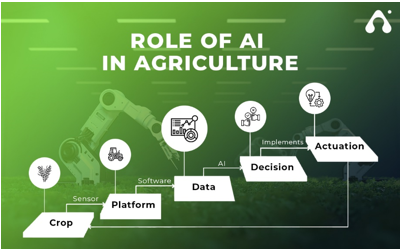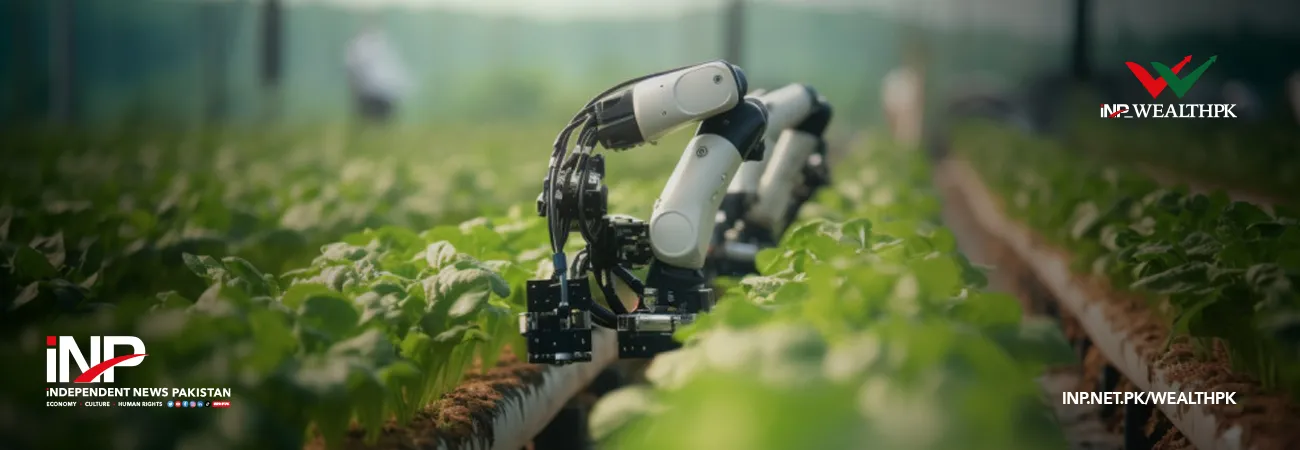INP-WealthPk
Azeem Ahmed Khan
Artificial Intelligence (AI) has the potential to transform Pakistan’s agricultural sector by improving efficiency, increasing exports, and ensuring long-term sustainability. However, several obstacles must be addressed to fully realise this potential.

This was stated by Maria Jawad Khan, a researcher at the Pakistan Institute of Development Economics (PIDE), while talking to WealthPK.
Citing a World Bank report, she highlighted that modernisation through technology could increase Pakistan’s agricultural exports by up to 50% through improved crop quality and diversified production. “Despite these benefits, Pakistan’s agriculture still faces significant challenges in adopting AI tools, including financial constraints, lack of technical expertise, inadequate rural infrastructure, and a general resistance to change among farmers.”
“The high upfront cost of AI technologies like precision tools and drones is a major hurdle, especially for small-scale farmers,” Maria Khan explained. “This problem is made worse by limited access to agriculture-specific credit and financing,” she added.
To improve access, she recommended targeted financial interventions such as subsidies, low-interest loans, and grants to enable farmers, particularly those with limited resources, to invest in advanced technologies. “Strengthening agricultural financing systems would lower economic barriers to adoption,” she suggested.
“Equally critical is the need to equip farmers with the necessary skills to use these technologies effectively,” she recommended. “Many farmers are not trained to operate high-tech equipment or interpret the data they collect,” she said, noting that while training initiatives exist, they are often limited in scope and outreach.
Maria Khan proposed that the government agencies, academic institutions, and the private sector should collaborate to deliver widespread training through workshops, field demonstrations, and hands-on programmes to ensure effective use of modern tools in everyday farming.
According to Maria Khan, poor infrastructure, especially in rural areas, is another key challenge. “Weak internet access and unstable electricity supply make it difficult for farmers to use digital platforms and mobile-based solutions,” she pointed out. “To unlock the full benefits of agricultural technology, rural infrastructure needs urgent upgrades, including reliable internet and power systems,” the PIDE researcher noted.
“Cultural resistance to change also impedes progress as many farmers are hesitant to abandon traditional farming practices in favour of unfamiliar technologies,” she observed. Maria Khan stressed the importance of building trust by demonstrating the tangible benefits of AI through pilot projects, farmer success stories, and consistent support throughout the transition process.
“Government support is vital to drive this technological shift,” she noted. “While policies to promote technology adoption exist, inconsistent implementation and lack of follow-through often stall progress,” she said and emphasised the need for clear, consistent, and farmer-friendly policies that promote innovation, safeguard livelihoods, and encourage sustainable practices.
“Creating farmer cooperatives or tech-user groups could also help ease the transition by fostering peer learning and collective decision-making,” she suggested. Looking ahead, Maria expressed optimism about the future of AI in agriculture in Pakistan. “As precision farming tools become more affordable and user-friendly, their adoption will grow, opening the door to a more efficient, resilient, and competitive agricultural sector in Pakistan.”
“Technologies such as drones, GPS-enabled machinery, mobile applications, and data analytics offer immense advantages,” she said, adding that these innovations can significantly boost productivity, reduce operational costs, and promote environmentally sustainable farming practices.
Credit: INP-WealthPk













